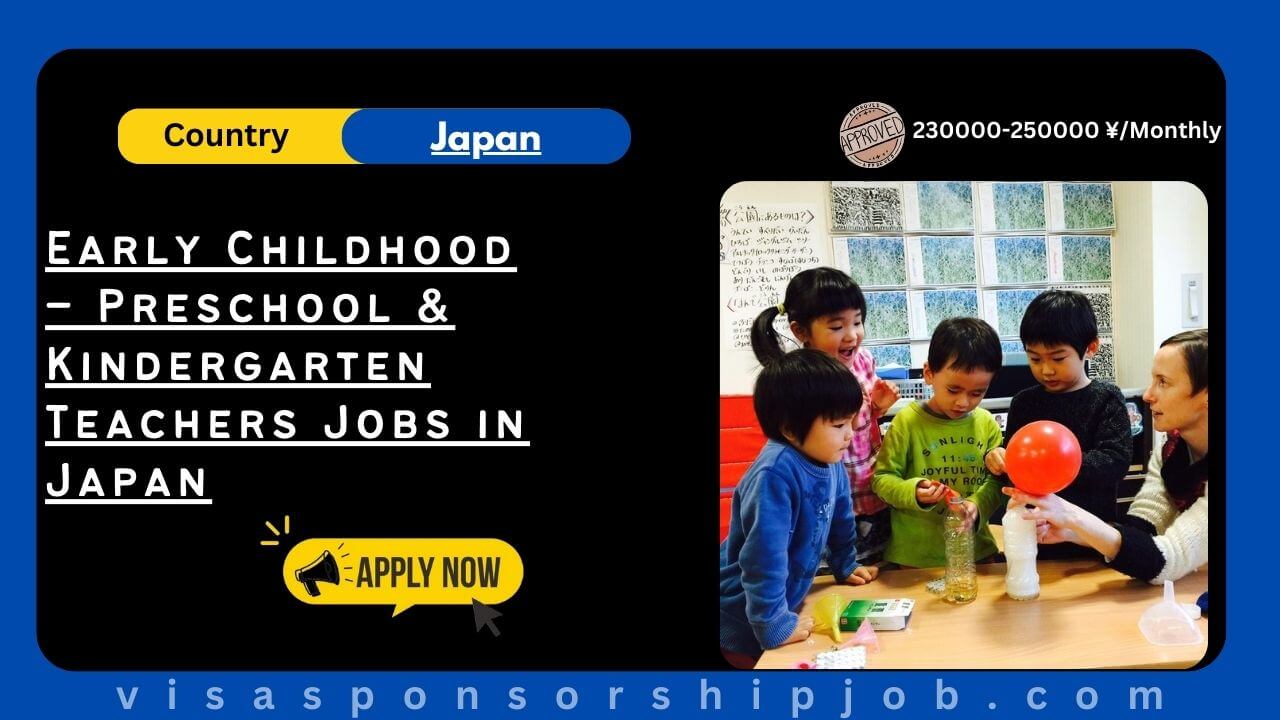Fifth Wings is looking for six PreK–Early Childhood and Kindergarten teachers who are passionate, committed, and have a lot of experience. They need Early Childhood and Preschool Teachers to help get young kids ready for kindergarten by getting them used to structured learning. You’ll teach them important things they’ll need to know when they start school.
Teachers who are already in Japan with the right visas and those who can come to Japan right away will be given the most attention. Teachers who are trained must love and understand children very much. To teach them well, you need to know about best practices and preschool teaching methods, as well as be able to keep their attention and earn their trust.
They are very good at English. Excellent understanding of how children grow and learn and how to teach them in preschool. Excellent ability to talk to people and teach them. Ability to help kids get along with each other. nice, and you can count on them. A BSc or BA in teaching or a related area is preferred.
You have to love kids, enjoy teaching them and playing with them, and be very excited about teaching. Teachers need to be kind, loving, artistic, flexible, open-minded, and able to work well with others. If your visa is about to run out, the company will pay for it and give you a full-year visa. The pay is between $230,000 and $250,000 per month, based on how long you’ve been on the job. The company can help you find a nice, cheap room near school. Let’s learn everything we can about Kindergarten Teacher Jobs in Japan with free Housing and Visa Sponsorship.
Key Points:
- Job Country: Japan
- Industry: Education
- Job Type: Preschool/ Kindergarten Teacher
- Minimum Experience Required: 2 years
- Education Required: Minimum Bachelor’s in Education
- Any Age Limit: No
- Visa: Sponsorship
- Relocation: Yes
- Accommodation: Yes
- Employment Term: Permanent and Full-Time
- Salary Hourly: 230,000 – ¥250,000 per month
Requirements of Early Childhood – Preschool & Kindergarten Teachers Jobs in Japan:
- From 6 months to 6 years old, it works well with babies, toddlers, and preschoolers.
- At least a Bachelor’s degree in Education with a PGCE or another license that is the same as a PGCE.
- have taught kindergarten for at least two years.
- They are very good at English.
- Excellent understanding of how children grow and learn and how to teach them in preschool.
- Excellent ability to talk to people and teach them.
- Ability to help kids get along with each other.
- nice, and you can count on them.
Duties of a Preschool & Kindergarten Teacher:
- Make a program for preschoolers that is well thought out and clever.
- Use different ways to teach children, like sharing stories, educational games, the media, etc.
- Watch each child to help them get better at getting along with others and feel better about themselves.
- You will also need to help the Japanese teacher with their lessons.
- Working together with other teachers, staff, and bosses is important.
- Keep the classroom clean and tidy according to health and safety rules.
Benefits of Early Childhood – Preschool & Kindergarten Teachers Jobs:
- Making a Difference: Early childhood educators are in a unique position to significantly influence the lives of young children throughout their formative years. Long-lasting effects may result from the affection for learning, social skills, and emotional development that they promote.
- Joy of Teaching Young Minds: The pleasure of instructing young minds: Working with young children can be extraordinarily fulfilling. Their curiosity, zeal, and vitality have the potential to infuse each workday with satisfaction and pleasure.
- Curriculum Development and Instruction: Early childhood educators are frequently granted the autonomy to employ innovative teaching approaches and develop their own curricula. Young learners can be actively involved and educated in an enjoyable way through the integration of play-based learning, hands-on activities, and artistic expression.
- Establishing Solid Foundations: Educators in preschool and kindergarten possess the critical duty of establishing the fundamentals that will support the academic achievements of young children in the years to come. They help children develop solid foundations for lifelong learning by emphasizing early literacy, numeracy, and social abilities.
- Observing Growth and Development: Early childhood educators are privy to the accelerated development and growth of young children through observation. Observing children reach significant developmental and affirming milestones can evoke profound joy and satisfaction.
- Collaboration with Families: In order to support the learning and development of children, preschool and kindergarten educators frequently collaborate closely with families and parents. Fostering robust collaborations with families has the potential to elevate the educational sphere and establish an atmosphere conducive to learning.
- Professional Development: Continuing education and professional development opportunities are provided by numerous early childhood education programs and institutions. Educators have the opportunity to improve their expertise, gain knowledge of emerging pedagogical approaches, and remain current with the latest developments in the discipline.
- Job Security: Job security is a prevailing concern for qualified early childhood educators, owing to the growing recognition and appreciation of the field. This field frequently offers opportunities in a variety of environments, including private preschools, public schools, and daycare centers, and job security is frequently high.
- Work-Life Balance: In comparison to other professions, early childhood education frequently provides advantageous work hours and holidays, thereby enhancing the work-life balance of its practitioners. Families and individuals with other personal obligations may find this equilibrium especially advantageous.
- Sense of Community: Early childhood education is frequently an environment that cultivates a profound sense of community among families, students, and educators. The provision of a supportive environment and a sense of belonging to teachers at their school or childcare center may enhance their job satisfaction.
Read More: Finland Student Visa Process – Permit for Studies
Who can Apply for Early Childhood – Preschool and kindergarten Teachers Jobs in Japan
All Asian, African, and Latin American countries, which usually look to the UK and other European countries for future jobs, can apply for Early Childhood and Preschool Kindergarten teacher jobs in Japan with Visa Sponsorship.
- Pakistan
- India
- Bangladesh
- Anguilla
- Antigua
- Barbuda
- Barbados
- Mexico
- Jamaica
- Dominicia
- Sudan
- Grenada
- Trinidad
- Tobago
- Lucia
- Vincent
- The Grenadines
- Kitts-Nevis
- Montserrat.
How to Apply for Early Childhood – Preschool & Kindergarten Teachers Jobs in Japan
Frequently Asked Questions:
What qualifications do you need to be a kindergarten teacher in Japan?
Getting in. To get a visa to work as a kindergarten teacher in Japan, you must have a college degree (in any field). This is true for 99% of teaching jobs. But you don’t have to be a teacher to do it.
Can a foreigner be a kindergarten teacher in Japan?
Yes. English teachers in Japan must be able to prove that they have a bachelor’s degree to get a visa. Many schools will want to see a photocopy of your diploma before they even interview you. The good news is that your degree can be applied to anything.
What kind of training are preschool teachers required to complete in Japan?
For preschool, elementary, and lower secondary teachers, the basic qualification for a first-class certificate is a bachelor’s degree. The basic qualification for a second-class certificate is two years of study (the acquisition of 62 credits) at a university or other postsecondary institution.






